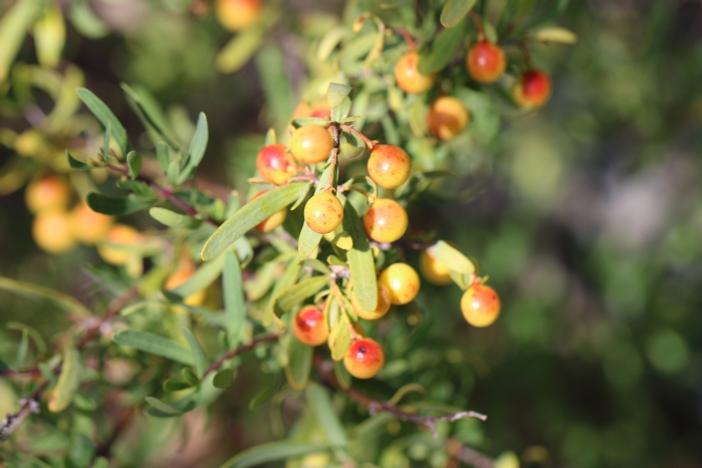Bush Rue
(Cneoridium dumosum)
Bush Rue (Cneoridium dumosum)
/
/

Photo by Easyscape
CC BY-SA 4.0
Image By:
Photo by Easyscape
Recorded By:
Copyright:
CC BY-SA 4.0
Copyright Notice:
http://creativecommons.org/licenses/by-sa/4.0/ | CC BY-SA 4.0























































Estimated Native Range
Summary
Cneoridium dumosum, commonly known as Bush Rue, is an evergreen shrub native to the chaparral and coastal sage scrub of Southern California, including San Clemente Island, and extending into Baja California Norte, Mexico. It is adapted to Mediterranean climates with hot, dry summers and mild, wet winters. Bush Rue typically grows to a height of 1.5 meters and spreads equally wide, with a rounded form. The plant features small, white flowers that bloom from winter to spring, which are followed by round, green berries resembling miniature citrus fruits. Each flower measures just over a centimeter wide, with four or rarely five rounded white petals and eight yellow-anthered stamens. The leaves emit a citrusy aroma, and the flowers have a sweet, citrusy perfume. The green berries are about half a centimeter wide, covered in a thin, gland-pitted peel.
Bush Rue is valued for its drought tolerance, aromatic foliage, and fragrant flowers. It is often used in native plant gardens, habitat restoration projects, and as an ornamental in xeriscaping due to its moderate size and low water requirements. While it can be challenging to establish, once settled, it is a long-lived, slow-growing plant that thrives with minimal care. Occasional watering during the hot season can enhance leaf color. Gardeners should be cautious of planting near walkways due to the risk of phytophotodermatitis from the foliage. In the fall or winter, leaves may turn yellow or orange with frost, and the plant can bloom in winter to spring, offering January flowers. Propagation is possible via cuttings or seeds. For optimal growth, Bush Rue prefers full sun to part shade and well-drained soils.CC BY-SA 4.0
Bush Rue is valued for its drought tolerance, aromatic foliage, and fragrant flowers. It is often used in native plant gardens, habitat restoration projects, and as an ornamental in xeriscaping due to its moderate size and low water requirements. While it can be challenging to establish, once settled, it is a long-lived, slow-growing plant that thrives with minimal care. Occasional watering during the hot season can enhance leaf color. Gardeners should be cautious of planting near walkways due to the risk of phytophotodermatitis from the foliage. In the fall or winter, leaves may turn yellow or orange with frost, and the plant can bloom in winter to spring, offering January flowers. Propagation is possible via cuttings or seeds. For optimal growth, Bush Rue prefers full sun to part shade and well-drained soils.CC BY-SA 4.0
Plant Description
- Plant Type: Shrubs
- Height: 3-5 feet
- Width: 3-5 feet
- Growth Rate: Moderate
- Flower Color: White, Yellow
- Flowering Season: Spring, Winter
- Leaf Retention: Evergreen
Growth Requirements
- Sun: Full Sun, Part Shade
- Water: Low
- Drainage: Fast, Medium, Slow
Common Uses
Bee Garden, Butterfly Garden, Deer Resistant, Drought Tolerant, Low Maintenance, Potted Plant
Natural Habitat
Native to the chaparral and coastal sage scrub of Southern California and Baja California Norte, Mexico, in Mediterranean climates
Other Names
Common Names: Coast Spice Bush
Scientific Names: Cneoridium dumosum , Pitavia dumosa
GBIF Accepted Name: Cneoridium dumosum (Nutt.) Hook.fil.